#compared to other situations
Text
hythlodaeus be like "teehee I hope I can be of some use" *clean headshot* 😊
bitch they wanted you for the aether-centric governmental position I know you think your curmudgeony cunt husband is amazing but stop selling yourself short its a slippery slope to sacrificing yourself to make god smh
#final fantasy xiv#ffxiv#im glad ee3 confirmed hes downplaying his own abilities bc soooooo many people just take characters at their word in this game#im always curious as to how his esteem issues developed I dont think its as simple as 'society' bc hes pretty accomplished in the context o#said society they wanted him on the convocation! hes in charge of a whole bureau and that doesnt mean no one ever made him feel bad and we#know erichthonious got mocked though his situation is more actively extreme but the main example of something hyth cant do is transformatio#which is considered preposterous to do in front of others most of the time so it seems like it wouldn't matter too much. maybe its moreso#that he sees others as better and more deserving and is constantly comparing himself and seeing others be better at him in certain areas#started to develop those esteem issues#siren says#funny post which is a trap for my character musings anyways#hythlodaeus
205 notes
·
View notes
Text
Shuro thoughts (1201 words)
If i had to assign a term to Shuro that describes his character, it’d probably be ‘a lack of connection with others’, many of shuro’s relationships in dungeon meshi follow a similar pattern, in that they're all very neutral. He feels like he’ll constantly be in his dad’s shadow no matter what he does, leading to him not trying much, along with some resentment towards him. There’s also his relationship with Maizuru,who was one of the more positive figures in his life who he ends up blocking out as he grows older. Even his relationship with Hien is kinda. Nonexistent. They used to be quite close when they were kids, but their friendship eventually deteriorated when they grew older.
It makes sense since the difference in status is more prevalent, but this made me think about how he reflects Laois. Even though they both have similar upbringings, with fathers who are in a leadership role which they would benefit from. Laios is still ostracized from the rest of his village, and pretty early on ends up leaving to become a soldier, where he ends up even more ostracized. It’s only when he leaves the army and goes to the island, that he becomes an adventurer and meets his party, where he finds companions who he’s on mostly friendly terms with. Despite everything he’s able to create his own life outside of his family.
Meanwhile Shuro has presumably lived with his family up until he gets sent off on his adventure. He’s constantly in his fathers shadow, and everyone that he’s surrounded with is in some way related to his father. The retainers are all employed under his father and are more or less lended to him. Even when he leaves for the island, he’s still connected to him by the quest that he’s sent on, and his retainers that follow him. He doesn’t come to the island for himself, it’s for a competition arranged by his dad.
Another way that they’re foils is through their siblings. Laios’s relationship to Falin is incredibly important to the story. They both clearly love each other and left home to find their own path side by side. But Shuro and his siblings have a large distance between them. It’s never stated why, but I don’t think it’s made better by the whole, competition for inheritance thing. I think it’s also interesting how Laios’s adventure brings him closer to Falin. While Shuro’s takes him away from his brothers, furthering the gap between them.
Even in laios’s party, where he’s able to make connections with people not from his home, he still can’t really connect with others. Namari and Chilchuck both drink after work, Falin and Marcille are besties and all get along pretty well. They’re all comfortable enough with each other to speak their mind and jokingly riff on each other, all except for Shuro, whose relationship with them is much more like co workers.
It’s the same in his old party. Hien and Benichidori are able to form a friendship with each other, and Tade forms a friendship with Izutsumi. But Shuro is distant from them all, to the point where him going “you guys did a good job, I’m sorry I dragged you guys down here” is enough to bring Maizuru to tears and confuse the hell out of them all. While Laios’s party criticizes him pretty openly, Shuro’s party instead just goes with what he does.
One similarity between him and Laios that I didn't really notice until now is that they both lack real friends, just for different reasons. Laios can’t find real friends because he can't read social cues or socialize well with other people, but he still tries to reach out to people even if things end up sour. Meanwhile Shuro doesn't have friends because he doesn't try to connect with other people, he's passive and only makes connections if they come to him first, ending in friendships that he’s not even happy with.
I also think it's interesting how he has a special relationship with both Touden siblings, just that one is out of love and one is out of hate 💀 Both of these relationships lead to him breaking out of his passive personality and making his own decisions instead of just moving through the motions. By falling in love with Falin, he makes the decision of finally leaving the party in order to form his own rescue team. Due to his hatred of Laios, he ends up getting into a fist fight and finally showing his true emotions and feelings. Both Touden siblings influence Shuro to make active decisions throughout the story (Proposing to Falin, leaving the party, deciding to turn marcille in, fighting Laios, etc). Even though these are bad decisions, (proposing to someone without any kind of romantic relationship first, fist fighting someone while half your party is dead), they are still him finding a voice. Both Laios and Falin make Shuro break away from what's expected and make his own path, even if it's very brief, and even if those decisions were very stupid.
Even though Shuro’s whole reason for coming to this island is the quest he’s sent on by his father, we don't really get much of that in the main manga, instead more focus is put on his relationship with Laios and Falin, (something something even narratively he finds his own path by having an arc based on his relationships instead of his quest). If he had an arc in the manga, I presume it would be around him finally understanding Laios? And eventually repairing the relationship between them and forming a real relationship (Though honestly i'm not sure about this). But nonetheless i think Shuro’s relationship with Laios does improve, even though he says he hates Laios, he also admits that he's envious of him.
The two of them have personalities that fundamentally clash with each other while reflecting the other. Shuros passiveness and Laios' lack of observation skills basically guarantee their relationship would go south, but they do manage to pick up the pieces, after beating the shit out of each other.
Laios and Shuro have a genuine talk where Shuro admits his envy, and even offers Laios a way to escape to the east, despite not being asked to. And in the final chapters, Shuro ends up hugging Laios with a genuine smile, despite not being comfortable with physical contact. Even though the two had a rough fight, their relationship manages to recover and become somewhat positive.
By the end of the story, even though it's implied that Falin rejected Shuro (good for her), he's still on good terms with the Toudens. He finally makes his own decisions and speaks, and even though things got kinda ugly, he's still able to have a positive relationship with Laios and Falin, not as besties or as a married couple, but just as fellow people. He finally finds his voice and speaks up, end creates connections by the end of it.
If anyone would like to add more to this or has points they wanna bring up please do ^^, these are just my disorganized thoughts that i finally wrote down.
#dungeon meshi#toshiro nakamoto#shuro#shuro does a lot of unlikeable things (atleast compared to other main characters) but i think that hes also got alot of depth#with his whole family and relationship situation#this is a very amatuer analysis and im not really experienced with this kind of writing?#so if this is worded weirdly then sorry ^^'#also it would be cool to see what other people think#and if i accidentally misinterperated his character 😭#WAIT I FORGOT THE READ MORE
183 notes
·
View notes
Text
I’ve seen a few posts pointing out how stampede vash lacks the anger that 98 and especially trimax vash has. Which is true.
And it is important. Because vash isn’t the too morally strong or good or kind to be angry or whatever. Vash has a lot of rage about a lot of things. he chooses to be kind despite it rather than not being angry at all.
His sheer determination to not give into anger and choosing kindness over and over again is very important to who he is.
(personally I think that while tristamp vash went through a lot already too, he simply has not quite reached that point)
What I haven’t really seen are post pointing out that stampede vash, unlike 98 and trimax vash, does not cry.
Vash cries a lot. Some of it is for the comedy and because he is dramatic like that and also he isn’t above trying to get pity that way (with little success lol).
But he also cries a lot just… because. I don’t know how to explain it.
Like vash has no shame or inhibition to cry when that’s what he feels. Not gonna lie, I know trimax mostly from spoilers so far (shame on me) but especially in 98 vash cries very freely. He cries when he thinks he will have to watch that ex-mob boss or whatever being shot. Cries after killing, cries after monev kills all these people and he wants to shot him but wont. And so so many more.
Like that time he just suddenly drops his donuts and cries in the middle of the street.
Vash is friendly and sociable on a surface level but he has cut himself off from so much. Keeps so many things on the inside. Crying seems the one thing he doesn’t hold back on. Maybe his only genuine outlet for the pain.
Vash hides his scars, his pain and much more but he never hides his tears.
Vash, in 98 even says ‘is there something wrong with that?’ when the kids note that he is crying despite being an adult.
In contrast to that, stampede vash never really cries. He even states that he doesn’t deserve to.
We see him shed tears just once, at the very end when it becomes clear to him that he can’t save nai and that his brother and him have grown so far apart that he barely recognizes him anymore. He sheds silent tears for nai, for them, at what he certainly believed to be the very end.
Stampede vash is not only a lot more timid than his counterpart but seems overall more repressed and and emotionally dulled/exhausted
#this reminds me that trimax and 98 vash as children would just follow knives around for a looong time with no agency of his own#vash cryinf after dropping the donuts kills me every time#i dont know how to say it but how vashs crying is handles compared to many other protags hits different#it feels more like seeing vash's pain and distress#and less like a visual reminder to the audience that this is a tragic situation#am i making sense?#maybe i am also just a little biased#also adding to this johnny young bosh was so good in that dub#none of the words vor abgestumpft seem quite right hmm#trigun#trimax#tristamp#vash the stampede#trigun 98#he also tries crocodil tears on meryl but she shot that down when he was barely a sniffle in so there is that lol
168 notes
·
View notes
Text
they come as a pair do not separate ‼️
#hoping another enemy of the world situation happens and the s4 tapes get found in some random basement#because there is criminally little footage of ben and polly compared to other companions#polly wright#ben jackson#classic who#doctor who#second doctor#ben and polly#edit
127 notes
·
View notes
Text


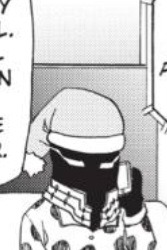
Save them.
#they're on a call with each other#comparing their idiots#my hero academia#bnha vigilantes#bnha smash#present mic#yamada hizashi#sir nighteye#sasaki mirai#kurogiri#that feeling when you have to be the adult in the situation even though you don't want to#how does kurogiri manage to look that exasperated? he doesn't even have a face#the neutral face of displeasure
319 notes
·
View notes
Text
I think what hurt the most to me when Tubbo died was that how Sunny felt and was treated sort of mirrored Leo after Trumps death. No one really acknowledged the impact of the death until it is so obvious in front of their faces or unless they were a parent/very close to the egg.
When Trump died no one, apart from Foolish, really acknowledged how Leo felt about Trumps death. About how it still affects her to this day and increased her fear of not having her close ones kept safe or alive. How her need to protect her loved ones has grown so intensely from that moment.
The same can be said for Sunny, no one but possibly Chayanne or Creation understand how Sunny must feel. Even still they don’t completely understand, because Tubbo was the one who she confided in over her fears of people disliking or excluding her or leaving her lonely. Her one constant that would never leave has now left her. Worst part of all of it, is that the death will follow Sunny, even when he comes back, she will still be haunted by what could have been and be set on trying to prevent it.
#like possibly i would be able to include richas here but i feel his situation was different bc everyone knew they were best friends#and so many actually greived bobby when his time came#also i know i compare them but they are so similar sorry 😭😭#qsmp#qsmp sunny#qsmp leonarda#qsmp leo#lmk if i need any other tags
143 notes
·
View notes
Text
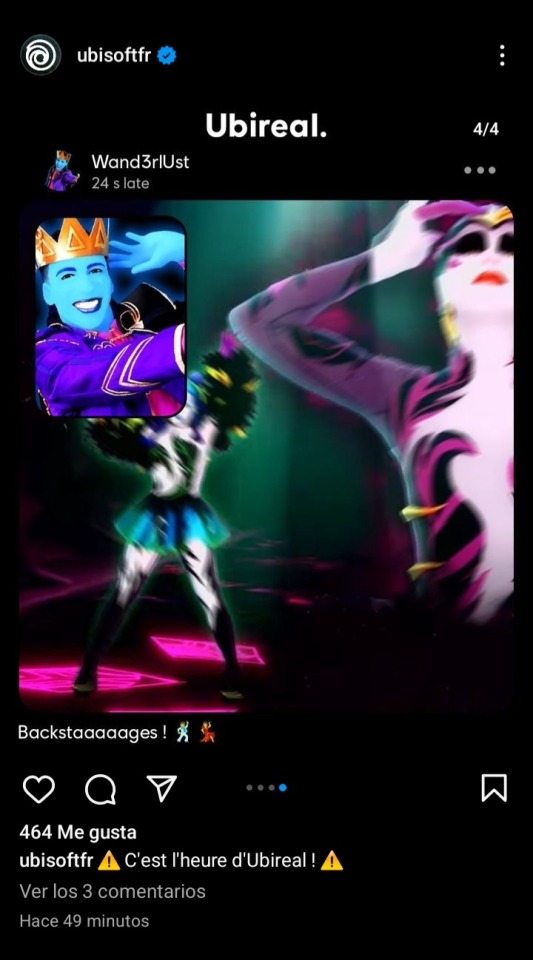
Now we know what he was doing while Sara was being kidnapped and corrupted
#just dance 2024#just dance 2023#jd wanderlust#jd sara#jd night swan#Idk how funny this is compare to the Other ones that are other character from other games posting landscapes#And then Wanderlust being in the middle of this situation#just dance
57 notes
·
View notes
Text
Max/Daniel is about to be overtaken by Max/Charles on AO3 so would now be a good time for me to admit that I just fundamentally do not See It ™️ with Max/Charles? I have never seen a duo that better fits the definition of workplace acquaintances.
#this is not an anti post#I am a filthy multishipper#I just…every interaction I see giffed of Max and Charles is in a situation where they were required to be together#like podium interviews or whatever#I would love to unlock 3K new fics I just don’t get it#especially compared to how they are with other drivers#f1#max verstappen#Charles Leclerc#daniel ricciardo#Maxiel
116 notes
·
View notes
Text
I say this as someone who obviously opposes the Vietnam war, the war in Afghanistan, and the current war in I/p, but I think a lot of Americans including one I was just talking to haven’t got a lot of comprehension that it sure took the uS a lot longer than five months for public opinion to shift strongly away from supporting any of the above, but furthermore - we dont fucking KNOW what the us gov or us public would do or support if they had a hostage crisis with hundreds of us civilians being held by the viet cong or taliban or Sinaloa cartel for months on end, with significant evidence of that group committing sexual assault, within kilometers of where Americans lived. This is not an equivalent thing thing that has ever happened to the us and for the sake of world peace we can be glad it never has, but it’s truly beyond our comprehension what the US (or uk or Canada and such) might do
#A lot of people seem not to grasp that I has incredibly disproportionate power and security relative to p in this situation#But neither is in any way comparable to the middle class white American level of safety#(Relative. There are other issues like gun control etc etc)#But like. It’s apples to oranges you have no idea what the us gov would do if like.#There were rockets periodically exploding over small town USA#The upper middle class residents of dc all had safety rooms in ther apartments#You don’t. Know
59 notes
·
View notes
Text
In today's episode of Shut Up Robin, Nobody Cares:
I finished Maison Ikkoku back in February, and I had a lot of feelings about the series. (It's good, do yourself a favor and go read it if you haven't.) As I read through it, I couldn't shake the thought: this is the caliber of romantic development Rumiko Takahashi can bring to the table?? We could've had this kind of relationship development in InuYasha??? 😭😭
The other thought I couldn't shake: InuYasha fans who still question the sincerity and depth of InuYasha's feelings for Kagome might benefit from reading Maison Ikkoku all the way to the end. They should read the final chapters of Maison Ikkoku, think for awhile about the blatant parallel themes found in InuYasha, and then try reevaluating InuKag's dynamic.
Now, I should clarify: I think the InuYasha series already makes it abundantly self-evident that the Inu/Kag/Kik "triangle" (🙄) is a complex situation that puts InuYasha in an extremely difficult position. (Well, it puts all of them in a difficult position, but you get the idea.) You just have to read the series with your brain on to see that. To review: teenage boy is tricked and terrorized by a demonic murderer; that demon successfully murders the boy's ex while masquerading as him; later his ex is revived from the dead against her will, wanders the earth as a vengeful spirit for awhile (who wouldn't be pissed about being brought back into that bullshit?), and is actively stalked by the demon who already murdered her once; teenage boy is falling in love with someone else when this happens, but he still wants to save his ex from being re-victimized by the demon who already brutally murdered her once. Anyone who sees that situation and describes it with a straight face as "InuYasha needs to make up his mind already" is probably never going to reconsider their assessment of InuYasha's character. They've already formed an opinion in defiance of the evidence. That ship done sailed.
But for some folks, I think experiencing the way Maison Ikkoku explores the same relationship themes—and particularly how it resolves those themes in the final chapters—could help them re-evaluate the emotional nuances in InuKag's relationship, and maybe help to re-contextualize the Inu/Kag/Kik conflict.
The parallels between Godai/Kyoko and InuYasha/Kagome are pretty obvious—Rumiko Takahashi consistently revisits this relationship dynamic in her work (it's present in Mao to a lesser extent). But I think Maison Ikkoku more directly confronts the emotional complexity of that dynamic. You can feel the difference in how RT more directly explores the messiness, complications, and pain of a) grieving a former relationship even while falling in love with someone else, and b) loving someone who is still tangled up in grieving their past. The InuYasha series obviously deals with those themes too, but Maison Ikkoku brings more focus and resolution to its exploration.
This may be for two reasons: 1) Maison Ikkoku had an older audience, as it was published in a seinen magazine geared for adult men between 18 - 40 years old, and 2) the relationship tension between Godai/Kyoko pretty much constitutes the main story of Maison Ikkoku; in InuYasha, the plot (such as it is) revolves around a vengeance quest and the monster of the week, and the relationship tensions between InuKag are second to that. Maybe that's why RT was more willing to get into the weeds with Godai/Kyoko and to more directly resolve the tension.
InuYasha does have some standout chapters where it explicitly deals with the tension of InuKag's situation (e.g., chapter 78, chapter 124, chapter 176, chapter 286, chapter 458, etc.), but there's this distinct hesitance in the narrative to resolve that tension in a substantive way. That's one of my beefs with the InuYasha series: it gives us moments of standout, concrete relationship development which then doesn't impact the future narrative all that much. The same relationship conflicts play out over and over again, well past their narrative expiration dates. See: Miroku flirting with women right in front of Sango after they've acknowledged feelings for each other; also the entire Kaō arc, which just... I do not understand the narrative purpose of that arc when it just exacerbates tensions that already existed and resolves none of them. Anyway. I digress.
You could argue this hesitance to permanently resolve relationship conflict comes from the episodic nature of InuYasha's storytelling. There's some truth to that, but that's not a satisfying explanation for why the main couple's relational status quo remains inert for the latter half of the series. Maison Ikkoku also does this to an extent—the "will they, won't they?" tension is strung along for as long as possible—but in general Maison Ikkoku does a better job of allowing relationship development to actually affect the narrative. Moments of emotional revelation and growth do change the relational status quo between Godai and Kyoko. They don't stay in quite the same relationship limbo that InuYasha and Kagome get stuck in for the latter half of the series. (It probably also helps that Maison Ikkoku is significantly shorter than InuYasha.)
All that to say: I think Godai/Kyoko is actually a useful mirror for examining InuKag, because they share the same themes and relationship dynamics without sharing the same narrative failings.
Okay, so: big time major spoilers ahead for Maison Ikkoku. Stop here if you don't want to see the conclusion of that series.
I want to look at how Maison Ikkoku's conclusion simultaneously revisits and resolves the main conflict between Godai/Kyoko.
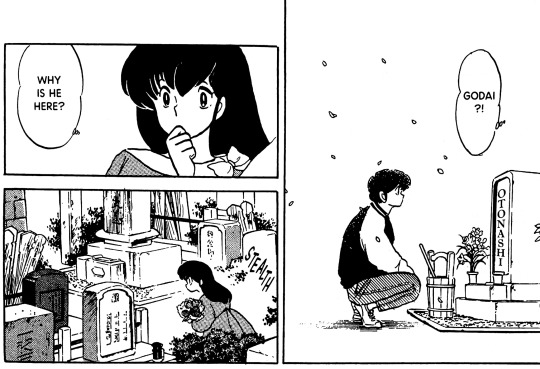
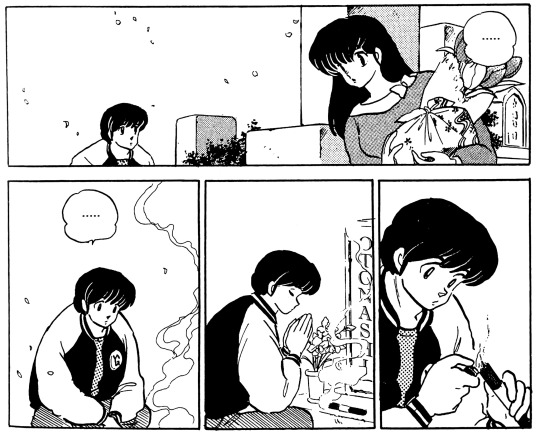
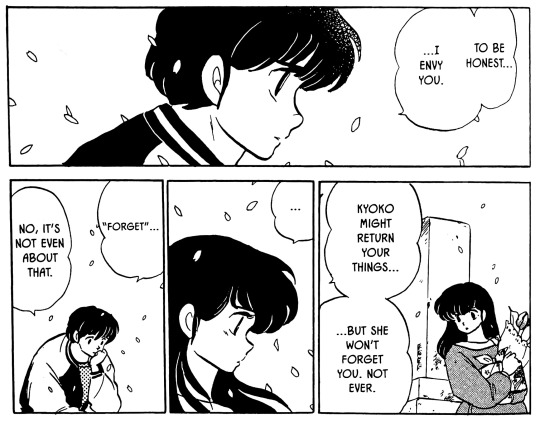
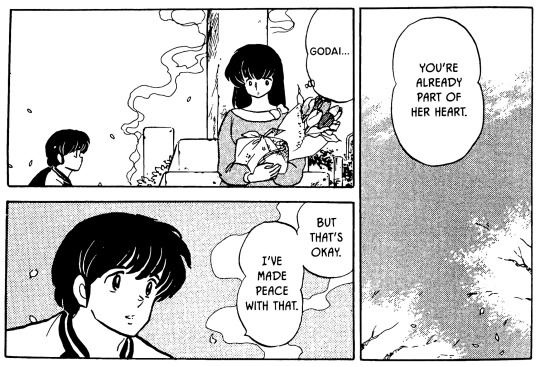
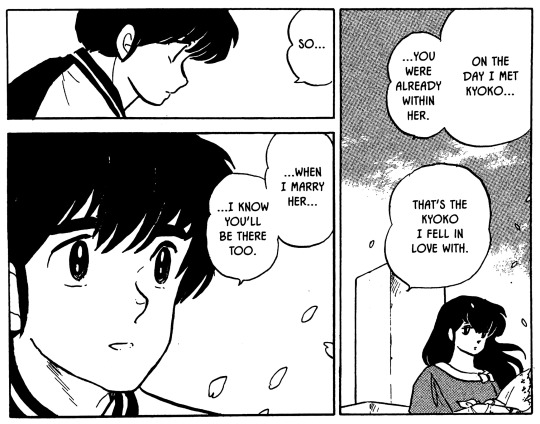
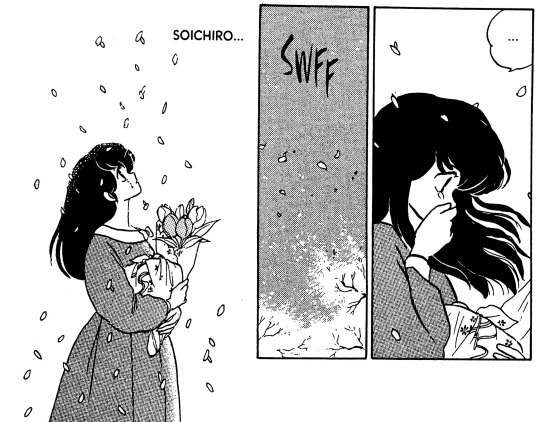
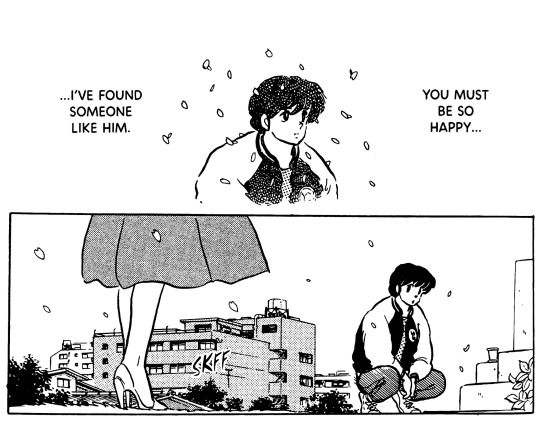
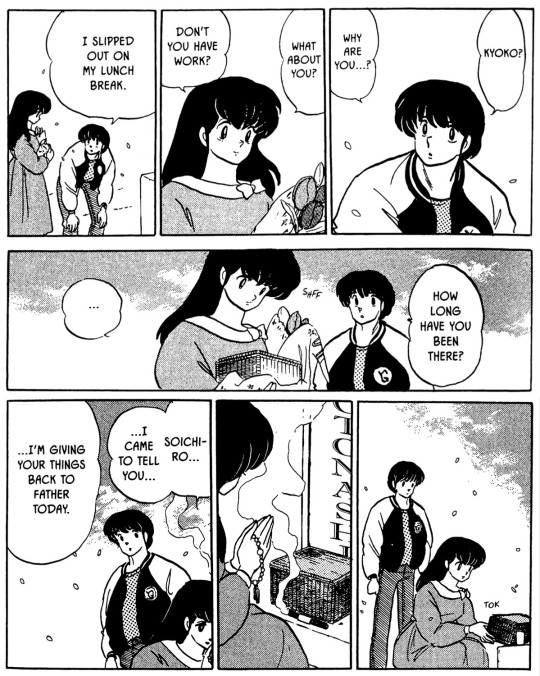
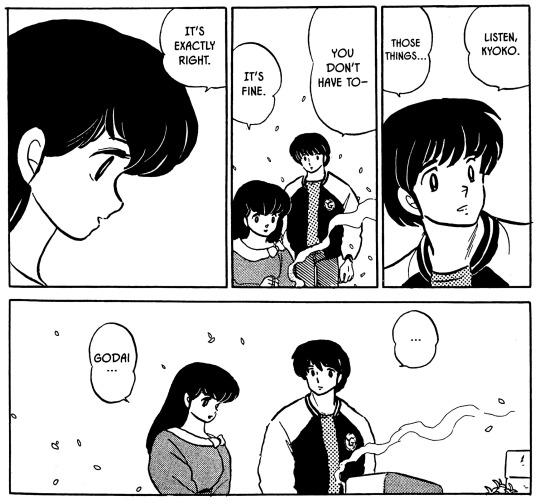
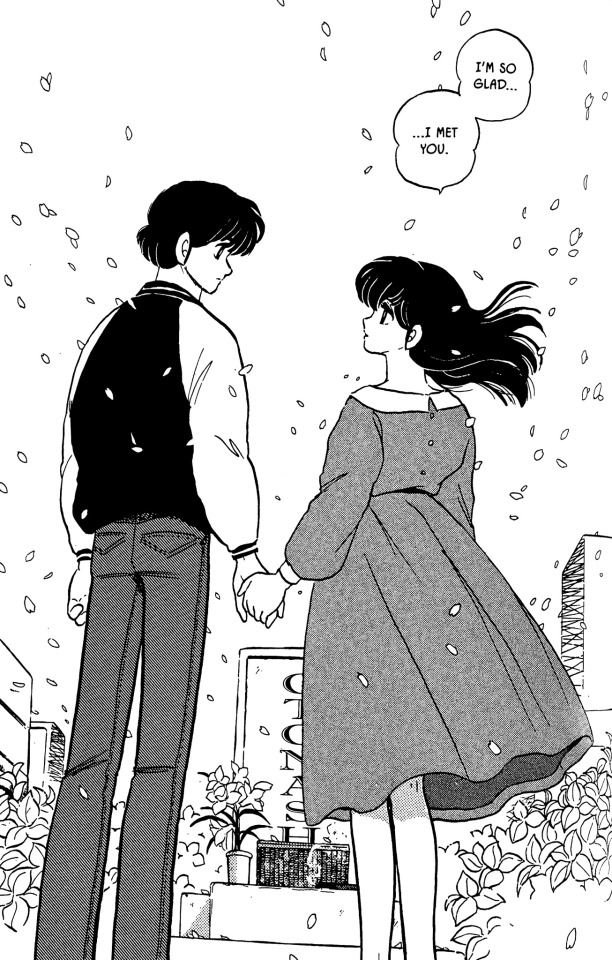
Ahhhhhh my feelings!!! Man I love this series.
Okay, let's review the major takeaways from this scene:
• Notice how the tension between Godai and Kyoko—Godai's struggle with insecurity and Kyoko's feelings for her deceased husband—mirrors the tension between InuKag. And notice that the reader is encouraged to sympathize with both Godai and Kyoko. Godai is not "at fault" for struggling with insecurity and feelings of jealousy. That's a natural human feeling to have, especially in a relationship that hasn't been anywhere near secure until very recently. And despite whatever jealousy or inadequacy he may be feeling, Godai tries to see things from Kyoko's perspective. Part of Godai's struggle—the heartache of it—is his understanding that Kyoko is also not at fault. It's not her fault that she married before she ever met Godai, it's not her fault her husband died, and it's not her fault that she's struggling with the grief of that tragedy. She's trying to reorient herself to her new life after loss; she's falling in love with Godai, but she's also scared of betraying her husband's memory. (Let's hold that mirror up to InuYasha now, shall we? SHALL WE?) Moving on from Soichiro emotionally represents to Kyoko a breach of duty to a loved one.
• To reiterate: neither Godai nor Kyoko are "at fault" in this situation. That's precisely why it's a tragedy. They both have to process painful, messy feelings; both their feelings are valid and understandable. (Hold that mirror up to InuKag, girl. HOLD IT UP.)
• Notice how Godai explicitly acknowledges that loving Kyoko means loving the Kyoko who once loved Soichiro. "On the day I met Kyoko, you were already within her. That's the Kyoko I fell in love with." It's impossible to divorce Kyoko from her feelings for her former husband: that part of her life significantly shaped her into who she is. And I just love that Godai is hashing out his feelings at Soichiro's grave: it shows a sort of respect for Soichiro's memory, but more importantly it also shows that Godai knows his negative feelings can't ultimately be "fixed" by Kyoko. If she could fix them, he'd be having this conversation with her. (And by this point in the series they have had this conversation.) But Godai knows he's the only one who can truly work through/resolve his insecurity—especially now, when Kyoko has already assured him that she loves him—and I love how the scene's setting subtly demonstrates that. Soichiro's ghost is haunting Godai's feelings, not Kyoko's, and Godai is trying to work through that with Soichiro himself. There's no love triangle to resolve here: what needs resolving is Godai's own feelings of inadequacy which no amount of assurance from Kyoko can ultimately "fix." This is his ghost to fight. (We get an echo of this kind of inner conflict in chapter 458 of InuYasha: Kagome directly wrestles with the "ghost" of Kikyo and struggles toward some resolution of her own insecurities.... Only for the Kaō arc to come along later and materially damage that resolution and character growth for no clear reason, BUT I DIGRESS.) And this scene shows that Godai wins that fight: he comes to understand that loving Kyoko has to include accepting her past. Kagome reaches a very similar understanding in chapters 175 and 176 of InuYasha.
• To reiterate: Maison Ikkoku's conclusion is not the resolution of a "love triangle." It's the resolution of a series-long conflict, which is completely different. In order for love triangles to work—to actually function as love triangles—two competing love interests have to be viable options. This is quite evidently not the case in Maison Ikkoku: Soichiro is dead at the start of the series. It's literally impossible for Kyoko to choose him in any meaningful way. RT blatantly acknowledges this early in the series when Kyoko's father-in-law tells her she has to live her life. I cannot stress enough how self-consciously the series is not about a love triangle between Godai/Kyoko/Soichiro. (Mitaka is another matter entirely, for a different post.) Rather, the series is about the damaging power of grief in our lives, the rocky and painfully non-linear journey to healing from that grief, and how messy, fraught, and ultimately profoundly beautiful it is to love another person for exactly who they are — past pain/trauma and all. (Please for the love of heaven hold that mirror up to InuKag.)
• No, you know what? I'm not leaving that at a parenthetical. I'm just gonna say it: exactly as Maison Ikkoku is not about a love triangle, InuYasha isn't either. For the same reasons as stated above, the Inu/Kag/Kik dynamic is not ultimately a love triangle because Kikyo is dead at the start of the series. And while her spirit is magically revived—in an altered/diminished form—she is still not truly alive. The story conspicuously communicates this: her body is literally created from decomposing bones and cannot sustain itself (she needs to consume souls—other deceased spirits—to remain animated), symbolically suggesting she is of the dead even as she walks among the living. This is a facsimile of life. RT is not subtle about this. Kikyo is a tragic and complex character whose arc can be interpreted in many ways, but I think it's fair to say that the series self-consciously represents her as a past which can't be recovered. The damage has been done. She is dead, time continues to move forward, and there's no reversing that. (That's, again, why it's a tragedy.) Even her resurrected body symbolically represents this reality via death imagery. Ergo, from the very start of the series—just as we see in Maison Ikkoku—Kikyo is not a truly viable option for InuYasha. He can't choose her in any meaningful way. To "choose" her would be to essentially choose death—abandonment of life—just as Kyoko choosing Soichiro would make her "a wife who hadn't died yet." Kikyo represents an irrecoverable past just as Soichiro does. And the main thematic trajectory of each series does not suggest that Kyoko/InuYasha should give up on life by choosing death — it suggests they should choose life. Godai and Kagome conspicuously represent life, the possibility of living into the future. (Kagome is literally from the future, that's how unsubtle RT is about this.)
(A quick aside while we're here: no, Kikyo's not being a viable option does nothing to diminish the sincerity of InuYasha's feelings for Kagome. Kagome is not a "second choice," for the love of God the series blatantly addresses that very thing many, many times—like it's right there y'all—and I have already written a long ass post about why Kagome's insecurity over InuYasha's feelings for her shouldn't be taken as gospel truth.)
So, rather than being an actual love triangle, I think the Inu/Kag/Kik dynamic is a complicated emotional landscape that explores the same themes Maison Ikkoku does: how grief and trauma affect our lives, how painful and messy it can be to heal from that grief, and that loving someone—choosing to take that mutual risk with them—means trusting that they mean it when they tell/show us they love us, and choosing to trust them more than our own insecurities.
It's just that Maison Ikkoku explores those themes a little better. 😅 Which is why I think it makes a good mirror for re-examining InuKag: all the same themes without all the narrative failings and missed opportunities. ✌🏼
#it's done!!!! I've been sitting on this since March @__@#there was a whole other section comparing and contrasting Maison Ikkoku's conclusion with chapter 176 in InuYasha...#but it was too meandering and I lost the plot on it so maybe I'll try that again in a different post one day lol#InuKag#Maison Ikkoku#analysis#that whole section where I basically said 'some emotional intelligence is required to understand InuYasha's situation'#that same sentiment caused the biggest shit fest I've ever seen on a fandom server#it was truly mind boggling#so naturally i've decided to write a 2200 word essay to more thoroughly explore that idea 😈
74 notes
·
View notes
Text
i literally don't know how i still manage to get stressed out in this office job. like how can a powerpoint have this much power over me
#like i should not get verge of tears anxiety over this job considering how easy it is compared to#every other job ive literally ever had. and YET!!!#i think thats just chronic anxiety though like panic attacks no matter the situation. smh
113 notes
·
View notes
Text
"OOo, Magneto's EMP probably disabled a bunch of hospital equipment, now he's just as bad as Bastion and Sinister"
Shut up. Holy shit, just shut the fuck up.
#x men 97#the most braindead take i've seen after the recent episode#how do you present people with a clear lose-lose situation where both options are shitty#but one will result in mass murder and enslavement of a minority#while the other won't#and immediately conclude that taking the second one makes erik a villain??#genuinely fuck you if you think that makes magneto as bad as the genocidal bigot who staged a massacre of national and then global scale#or the man explicitly compared to josef mengele#the episode literally spelled it out#magneto was right#always
35 notes
·
View notes
Text

Not gonna get into danganronpa another spoilers because this whole scene is something else that I’m still processing but I absolutely love this line. Like to bring up milgram I think this is an idea which can reflect on lots of the characters as well. The idea of basing your entire existence off of a certain thing/person/ideology and then for something to happen that completely destroys that. Your entire person has been stripped away and just what’s left? You can’t comprehend your own existence or meaning without that specific attachment and you start to question all of your actions based off that…
I can only really think of John, Kotoko, and Es here (and possibly Amane and Mikoto to an extent). And John bases his life off of Mikoto, Kotoko upholding justice, and Es being the warden.
John’s idea of his whole existence and reason for being is Mikoto. It’s the only reason he believes he exists and if he were to fulfill his role he’d “disappear” as he would be completely worthless without him. John tries to repress and ignore his humanity and reduce himself as a tool to protect Mikoto and that’s all he can see himself as. But now Mikoto’s starting to not deny his existence and feels pure hatred for everything about him. And what will happen to John, when the person he’s dedicated his entire life to and desperately wants praise from, denies his existence? What will he be but some worthless existence that is only a burden, to him.
Kotoko. An ideology of upholding justice and punishing evil that has completely overtaken her. She has pushed herself into a role of a “fang” for justice, protecting the weak and persecuting evil. But even so matter how much she tries, she knows her goals are unreachable. She denies relationships and attachments to other people based on this ideology. Kotoko admits that she does feel attachment to the prisoners, but has to deny them in order to fulfill the role as a tool. And believes that pain and violence is necessary to achieving a greater good. Trying to deny any regret because wouldn’t it be easier to believe you’re entirely in the right? She latched onto Es, believing them to be similar as the warden who carries out judgement on wether the prisoners are forgivable or not. But now, Es has denied her whole ideology, her whole existence due to the pain she’s caused. Kotoko wants to believe that what she did was right and that Es, another enforcer of justice would accept her, because that’s how it is.
And Es… they’re the warden of the prison. There’s nothing more to them than that they believe. Es has no memories of their identity or past before Milgram and immediately latched onto the identity given to them, of being the guard. Es took this role as their entire identity, an extension of the milgram system in order to interrogate and judge prisoners. I think Muu put this best.
“Warden-san, we call you "warden" because that's what you are, right? And I was assigned the role of prisoner, but that doesn't mean I'm now nothing but a prisoner at heart, too. After all, I'm still me.”
Es has an unstable sense of identity, to the point they latched on to the first thing they were given in order to give themselves a purpose and a meaning for existence. And Kotoko calling them “imperfect caused them to question their identity. But as the story progresses Es will probably begin to learn about the audiences control and the truth behind what they assumed to be their verdicts. That their will never was 100% their own. Who knows what Es’ past was, but eventually they’ll likely have to tackle it and their whole identity, the warden, the arms of milgram, is gone.
gonna think about Mikoto and Amane here as well. Mikoto, although may not seem to be as first, focuses his entire identity around other people. He’s the friendly sociable guy who’s easy to chat with. But that’s all he believes he should be, I guess. As perhaps this mindset is upheld by an inherent fear of other people rejecting him, so he focuses all his attention and identity on being a social person. He’s never truly friends with people, as perhaps that would be “too close” and open up the possibility for danger. He doesn’t completely deny his identity like the others, but he molds and shapes it in a way that is acceptable to others. He likes what everyone else likes and does what everyone else does so the fear of being rejected for being different won’t hurt him. But now he’s stopped denying John’s existence and his DID, believing himself to be crazy, and to be completely rejected from other people, his entire sense of identity to an extent. And especially with John scaring other people off with the mindset that will help Mikoto, he has now been completely distanced from everyone else and now has to come to terms with himself, but not the ideal persona he put on to be acceptable to other people.
Amane is a more different case as she in a way has rejected that idea, but not completely. Growing up in a cult it’s very likely that she was always conditioned that she was just a servant for god. That all the good things she did were actually god blessing her and all the bad things a fault of her humanity, herself as a person. She is in a unstable relationship with the whole submitting her personhood to her religion, as she sacrificed her ideologies in order to help a cat. But at the core, that wasn’t about herself and her identity, rather a focus on the cat’s life. Amane’s murder was her will. Rejecting everything and fighting for her life in direct opposition to what she has been taught her entire life and how her identity should be, a rejection of that and a glance into “herself”. But once again, this murder wasn’t entirely self motivated. She’s still broken enough that she can’t fully grasp herself as a person besides god and religion. And a large cause of her murder was out of the death of the cat, rather than simply protecting herself. Amane still slips back into the belief that her personhood is entirely dedicated to god. As she tried to convince herself and Es that the only reason she killed is because they deserved religious punishment and she is in the right for carrying out god’s will, once again denying her personal reason for doing so. Reducing herself to “we” on behalf of her religion, that this isn’t herself anymore. Amane is in a limbo between rejecting her personhood for god, but at the same time rejecting the suffering she’s been through in order to save “herself”. Amane’s case is so interesting, as there’s no clear answer of what she believes in here, and it is truly fascinating.
#milgram#Milgram theory#milgram analysis#amane momose#mikoto kayano#john kayano#john milgram#kotoko yuzuriha#es milgram#uhhhh this was meant to be a quick analysis how did this turn into an exploration of the identities of 5 characters#And comparing it to a scene from dra which focused a lot around the loss of someone’s beliefs completely destroying their identity?#May analyse that scene directly because the whole philosophical and psychological concepts coming into play there is just soooo cool#and man I was kinda figuring out stuff as I was writing this but like I said it’s so interesting how Amane isn’t completely dedicated to go#Like the other characters I mentioned who have dedicated their whole identities to something#And Amane’s at the struggling between her true self and her perfect religious self#But perhaps she doesn’t entirely realise this conflict going on within#Which is interesting as a realisation of their identities would probably cause the other characters to lose it#But Amane it’s coming to her in a different way#She’s so strong uahhhahhajajshshshs#Tw cults#Ok now thinking about this more I’m starting to see this whole ideology apply to other dra characters as well#Man this is just so interesting#Like Kinji although having nowhere near as bad of a situation of amane was in a way forced to repress his emotions his entire life#Due to religious reasons and to devote his life to god and reject personhood#Surprisingly he’s actually not a bad person but still is very stoic and avoids other people due to being taught those values#And kinji’s a whole parallel to Tsurugi so this would be really interesting#I would talk about Tsurugi here but this is primarily a milgram post so for everything he’s like kotoko with a dedication to justice#But handles it in a very different way#His story is just way to long to analyse now#But hey this is an invitation to play (or watch bc downloading the game is hard technically) danganronpa another
24 notes
·
View notes
Note
[1] `there are often translations available in other languages long before English ones` This is really interesting! I'm familiar with translation in games, where english is often a very early target (a small game might get 0-5 translations, depending on amount of text) because the size of the market is larger.
[2] Do you happen to know why this is different for books? Is it faster to come to a deal about publication rights for some other languages to get started on the translation? Is translation to english harder (at least from French) than to say, Spanish?
The literary translation situation has long been very dismal in the English-speaking world! I don’t know a lot about video games, but are localisations provided by the company that makes the game? Because if that's the case it makes sense that games would get translated into English as a priority. For literary translations which are imported rather than exported, other countries have to decide to translate a foreign author and anglo countries (US, UK and Canada at least) are not very interested in foreign literature. There's something known as the "3% rule" in translation—i.e. about 3% of all published books in the US in any given year are translations. Some recent sources say this figure is outdated and it’s now something like 5% (... god) but note that it encompasses all translations, and most of it is technical translation (instruction manuals, etc). The percentage of novels in translation published in the UK is 5-6% from what I’ve read and it’s lower in the US. In France it's 33%, and that’s not unusually high compared to other European countries.
I don't think it's only because of the global influence of English* and the higher proportion of English speakers in other countries than [insert language] speakers in the US, or poor language education in schools etc, because just consider how many people in the US speak Spanish—I just looked it up and native Spanish speakers in the US represent nearly 2/3rds of the population of France, and yet in 2014 (most recent solid stat I could find) the US published only 67 books translated from Spanish. France with a much smaller % of native Spanish speakers (and literary market) published ~370 translations from Spanish that same year. All languages combined, the total number of new translations published in France in 2014 was 11,859; in Spain it was 19,865; the same year the US published 618 new translations. France translated more books from German alone (754) than the US did from all languages combined, and German is only our 3rd most translated language (and a distant third at that!). The number of new translations I found in the US in 2018 was 632 so the 3% figure is probably still accurate enough.
* When I say it’s not just about the global influence of English—obviously that plays a huge role but I mean there’s also a factor of cultural isolationism at play. If you take English out of the equation there’s still a lot more cultural exchange (in terms of literature) between other countries. Take Olga Tokarczuk’s Drive Your Plow Over the Bones of the Dead; it was published in 2009, and (to give a few examples) translated in Swedish 1 year later, in Russian & German 2 years later, in French, Danish & Italian 3 years later, in English 10 years later—only after she won the Nobel. I’m reminded of the former secretary for the Nobel Prize who said Americans “don't really participate in the big dialogue of literature” because they don’t translate enough. I think it's a similar phenomenon as the one described in the "How US culture ate the world" article; the US is more interested in exporting its culture than in importing cultural products from the rest of the world. And sure, anglo culture is spread over most continents so there’s still a diversity of voices that write in English (from India, South Africa, etc etc) but that creates pressure for authors to adopt English as their literary language. The dearth of English translation doesn’t just mean that monolingual anglophones are cut off from a lot of great literature, but also that authors who write in minority languages are cut off from the global visibility an English translation could give them, as it could serve as a bridge to be translated in a lot more languages, and as a way to become eligible for major literary prizes including the Nobel.
Considering that women are less translated than men and represent a minority (about 1/3) of that already abysmally low 3% figure, I find the recent successes of English translations of women writers encouraging—Olga Tokarczuk, Banana Yoshimoto, Han Kang, Valeria Luiselli, Samanta Schweblin, Sayaka Murata, Leila Slimani, of course Elena Ferrante... Hopefully this is a trend that continues & increases! I remember this New Yorker article from years ago, “Do You Have to Win the Nobel Prize to Be Translated?”, in which a US small press owner said “there’s just no demand in this country” (for translated works); but the article acknowledged that it’s also a chicken-and-egg problem. Traditional publishers who have the budget to market them properly don’t release many translations as (among other things) they think US readers are reluctant to read translated foreign literature, and the indie presses who release the lion’s share of translated works (I read it was about 80%) don’t have the budget to promote them so people don’t buy them so the assumption that readers aren’t interested lives on. So maybe social media can slowly change the situation by showing that anglo readers are interested in translated books if they just get to find out about them...
#ask#anyway it's difficult to find accurate stats for translation and compare between countries because some % you see are#for all translations and as i said technical translations / computer manuals etc make up the bulk of it#some % are averages over decades; others only for fiction or for novels & poetry etc so you end up comparing apples and oranges#but the fact remains that the three percent website (translation database) was able to list every single literary translation#published in the us year after year and it was never higher than 600-ish titles in the 2010s. it's not great#when you see much smaller countries release translations in the thousands or tens of thousands#it's also not a huge improvement over the 400-ish yearly US translations in the 00s#but they haven't released numbers for the past few years and maybe the situation is a bit better now
366 notes
·
View notes
Text
Volunteers after delivering groceries in a quarantined neighborhood
#douyin#video#tiktok#this reminds me I read an article the other day that was like#‘china’s economy in SHAMBLES. the west has STABILIZED the public health situation meanwhile!!’#immediately closed the tab#like lmao 1 million+ American s have died from Covid compared to like 5k in China#but sure the west has stabilized the public health situation right right
456 notes
·
View notes
Text
yknow what i'll put this in the main tags one of my main worries with this (other than the safety of the cg illustrator that was fired and employees at project moon obviously) is that it feels like everytime theres a controversy, project moon just lie down and take it. theyre like doormats. appeasing them isnt going to make them stop, if anything it makes them more likely to do something like this again because they know its going to work and because it HAS before (im looking at ruina)
#hiiii this is me from tomorrow. they were legally allowed to fire the artist yes but i still dont agree w the decision#also adding this bc this is still getting traction one thing ive seen no one talk abt (bc its not important compared to everything else)#is that pmoon originally made limbus a gacha to fund their other projects. im not saying this as like a guilt trip or something 2 consider#btw. im saying it bc they have most definitely lost a chunk of their fanbase bc of this decision and therefore revenue#project moon#limbus company#library of ruina#lobotomy corporation#projmoon#i have sympathy for them ofc bc its a horrifying situation but im still disappointed abt how its dealt with#u are running a gacha game now its genuinely REALLY concerning if u resolve that type of shit like this#text
105 notes
·
View notes